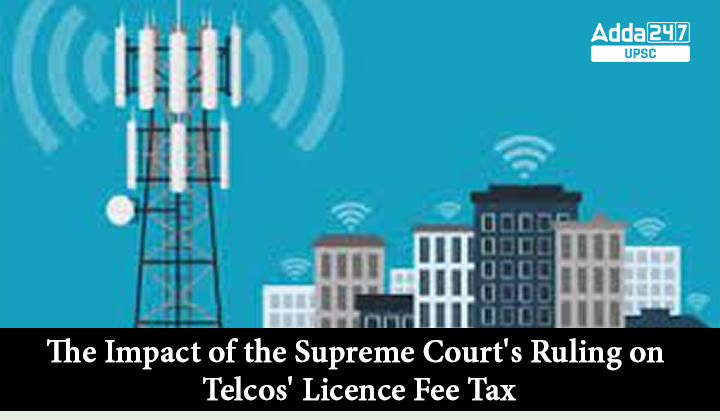Table of Contents
In a recent ruling, the Supreme Court of India declared that the license fees paid by telecom companies, such as Bharti Airtel and Vodafone Idea, should be treated as capital expenditure rather than revenue expenditure. This decision overturns previous rulings by the Delhi, Bombay, and Karnataka High Courts, which had favored the telecom firms. The court’s judgment has significant implications for the telecom industry, as it will impact the taxability and financial position of these companies. This article delves into the details of the ruling and explores its potential impact on telcos.
Telcos’ Licence Fee Tax Supreme Court’s Decision
The Supreme Court held that the annual payment of license fees, based on adjusted gross revenue (AGR), should be considered as capital expenditure. The court dismissed the telecom companies’ contention that the fees should be treated as revenue expenditure since they are paid based on the annual gross revenue. The court stated that a single transaction cannot be artificially split into capital and revenue payments based solely on the mode of payment. The ruling sets aside the orders of the Delhi High Court, Bombay High Court, and Karnataka High Court.
Understanding Capital and Revenue Expenditure
To comprehend the impact of the Supreme Court’s ruling, it is crucial to understand the difference between capital and revenue expenditure. Capital expenditure refers to the amount spent by a company to acquire, maintain, or improve its fixed assets, such as buildings, vehicles, equipment, or land. On the other hand, revenue expenditure includes administrative expenses incurred to meet the operational costs of running a business, such as rent, utilities, property taxes, and business travel.
Telecom Industry’s Treatment of Licence Fees
Before the Supreme Court’s ruling, telecom companies treated license fees as revenue expenditure, allowing them to claim deductions on variable license fees for tax purposes. However, following the court’s decision, these fees will now be classified as capital expenditure. This change will require telecom companies to amortize the license fees over the license period, rather than deducting the entire expenditure at once.
Impact on Telecom Companies
The Supreme Court’s ruling is expected to have a significant impact on telecom companies, particularly Bharti Airtel and Vodafone Idea. Initially, the change in accounting treatment may lead to higher EBITDA/PBT (earnings before interest, taxes, depreciation, and amortization/profit before tax) but lower cash flow due to increased tax outgo. However, over the duration of the license period, the financial impact is likely to balance out.
The ruling may also impact the tax liabilities of telecom companies. The income tax authorities are expected to raise demands for any shortfall in tax payments for previous periods, along with applicable penalties. For telcos that have completed 20 years of the license, the past tax shortfall would likely apply only to differences in payment timing and changes in tax rates. However, if a company is yet to complete the full license period or has recently renewed its license, the ruling could have a more significant impact.
Revisiting Deductibility of Expenses
The Supreme Court’s decision may prompt telecom companies to reassess the deductibility of expenses incurred to obtain licenses. The ruling questions the basis on which telecom operators deducted these expenses previously. The disallowance of these expenses could further impact companies that are already facing substantial losses. It remains to be seen how telecom companies will navigate this change in deductibility.
Review Petitions and Future Steps
Given the potential financial impact and implications of the Supreme Court’s ruling, telecom companies are likely to file review petitions. These petitions aim to challenge or modify the court’s decision and provide clarity on various aspects, such as the retrospective application of the ruling. The review process may delay the determination of the actual tax liabilities for telecom companies.
Expert Opinions
Experts have expressed concerns regarding the impact of the Supreme Court’s ruling on the telecom industry. Mihir Gandhi, a partner at BDO India, emphasizes the adverse effect of disallowing expenses on companies already facing significant losses. The decision challenges the reasonable basis provided by previous high court judgments and further complicates the deductibility of expenses for telecom operators.
Sandeep Sehgal, a partner at AKM Global, believes that the Supreme Court’s ruling brings much-needed clarity to the classification of expenditure as capital or revenue. He highlights the importance of considering the core nature of the expenditure, even when it is structured in installments or linked to variables.
Future Outlook and Conclusion
The Supreme Court’s ruling on the treatment of license fees as capital expenditure has created uncertainty within the telecom industry. The change in accounting treatment and the potential tax liabilities have prompted telecom companies to reconsider their financial strategies and deductions. The review petitions filed by these companies will shed further light on the implications of the ruling and provide clarity on various aspects. As the telecom industry navigates these challenges, it remains to be seen how the sector will adapt to the new financial landscape shaped by the Supreme Court’s decision.
In conclusion, the Supreme Court’s ruling has far-reaching consequences for telecom companies, particularly in terms of their tax liabilities and financial position. The shift from treating license fees as revenue expenditure to capital expenditure necessitates a change in accounting practices and may impact cash flow initially. The review petitions filed by telecom companies will determine the future course of action and provide further clarity on the applicability of the ruling. As the industry awaits further developments, telecom operators must adapt their financial strategies to ensure compliance with the Supreme Court’s decision.



 TSPSC Group 1 Question Paper 2024, Downl...
TSPSC Group 1 Question Paper 2024, Downl...
 TSPSC Group 1 Answer key 2024 Out, Downl...
TSPSC Group 1 Answer key 2024 Out, Downl...
 UPSC Prelims 2024 Question Paper, Downlo...
UPSC Prelims 2024 Question Paper, Downlo...
